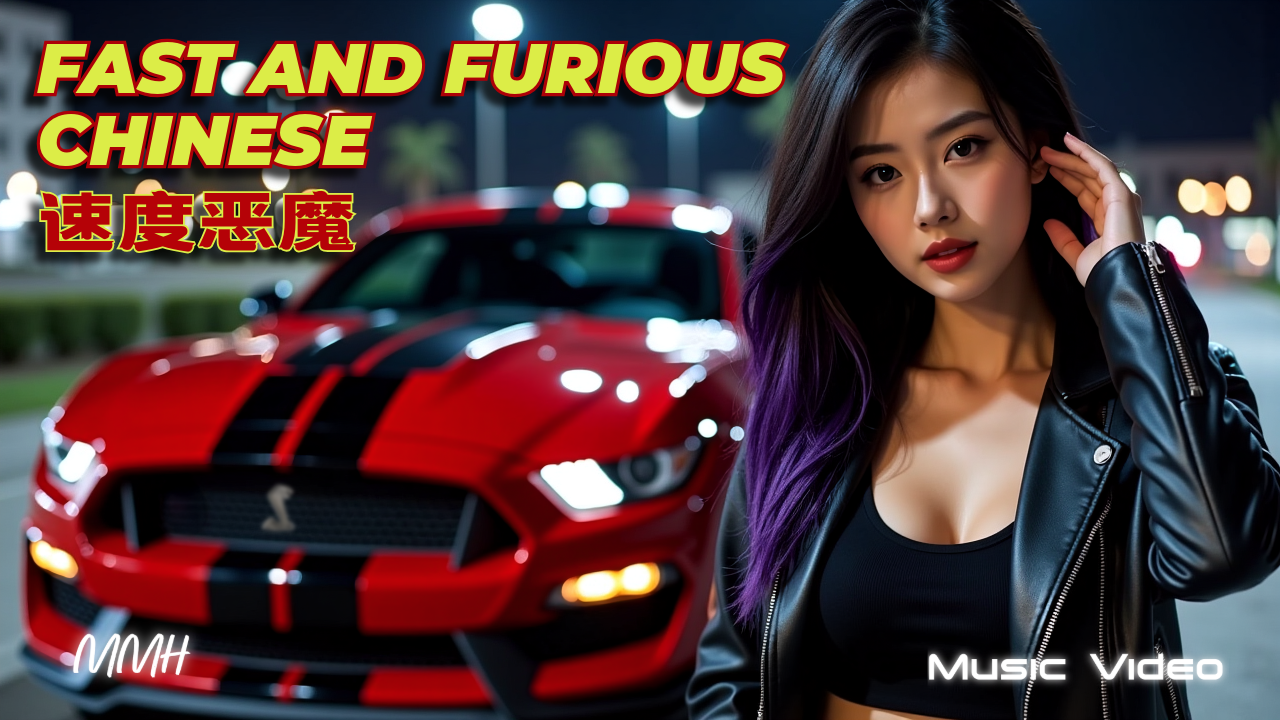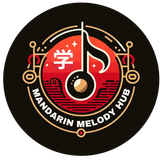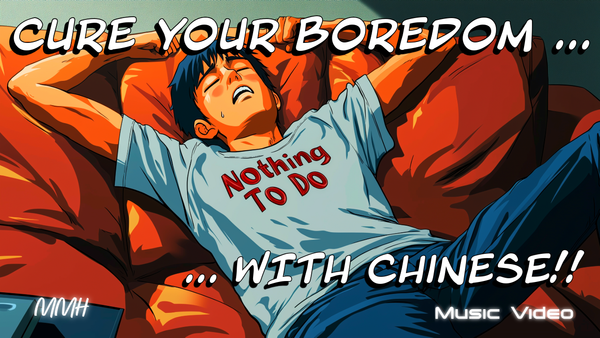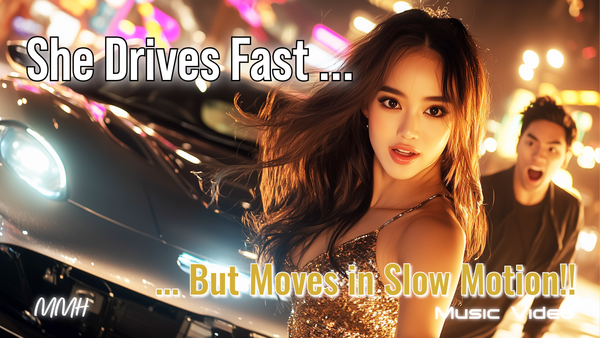Learn Chinese at Lightning Speed: Speed Demon

She's tearing through city streets outrunning everyone – learn powerful Chinese vocabulary for speed, confidence, and high-octane action that'll leave you breathless.
🎵 Watch & Listen
Originally Released June 12, 2025
🎮 Practice with Interactive Flashcards
Master every Chinese word from this high-speed racing adventure! Our interactive flashcard system helps you practice all 50+ vocabulary words with spaced repetition and multiple learning modes.
→ Practice "Speed Demon" Flashcards
The Story Behind the Song
Get ready for the ultimate adrenaline rush as our speed demon protagonist tears through the city streets in her sleek sports car! This electrifying music video follows a confident female racer as she outmaneuvers challengers, evades police, and proves that nobody can catch her. From the opening red light challenge to the dramatic drawbridge escape, every moment is packed with heart-pounding action and style.
"Speed Demon" (速度恶魔) offers an exciting way to learn essential Chinese vocabulary around confidence, speed, and movement. Perfect for HSK 1-3 learners, this song combines high-energy electro-rock music with practical phrases you'll actually use. The hyperrealistic AI-generated visuals create a cinematic experience that makes learning Chinese feel like watching a blockbuster action movie.
This isn't just about cars and racing - it's about building confidence in Chinese through bold, memorable vocabulary. The song's protagonist embodies the fearless attitude that language learners need, showing that with the right mindset and vocabulary, you can navigate any challenge at lightning speed.
Complete Song Lyrics
[Intro]
{風|fēng - wind}{吹|chuī - blow}{這|zhè - this}{我|wǒ - I/me}{的|de - possessive}{頭髮|tóu fà - hair}
{Fēng|風 - wind} {chuī|吹 - blow} {zhè|這 - this} {wǒ|我 - I/me} {de|的 - possessive} {tóu fà|頭髮 - hair} — Wind blows through my hair
{红灯|hóng dēng - red light}{已|yǐ - already}{变|biàn - change}{绿|lǜ - green}
{Hóng dēng|红灯 - red light} {yǐ|已 - already} {biàn|变 - change} {lǜ|绿 - green} — Red light has turned green
{引擎|yǐn qíng - engine}{發出|fā chū - emit}{噪音|zào yīn - noise}
{Yǐn qíng|引擎 - engine} {fā chū|發出 - emit} {zào yīn|噪音 - noise} — Engine makes noise
{司机|sī jī - driver}{都|dōu - all}{认为|rèn wéi - think}{我|wǒ - I/me}{最快|zuì kuài - fastest}
{Sī jī|司机 - driver} {dōu|都 - all} {rèn wéi|认为 - think} {wǒ|我 - I/me} {zuì kuài|最快 - fastest} — All the drivers think I'm the fastest
[Pre-Chorus]
{谁|shuí - who}{能|néng - can}{追上|zhuī shàng - catch up}{我|wǒ - I/me}?
{Shuí|谁 - who} {néng|能 - can} {zhuī shàng|追上 - catch up} {wǒ|我 - I/me}? — Who can catch up to me?
{我|wǒ - I/me}{的|de - possessive}{车|chē - car}{已|yǐ - already}{消失|xiāo shī - disappear}!
{Wǒ|我 - I/me} {de|的 - possessive} {chē|车 - car} {yǐ|已 - already} {xiāo shī|消失 - disappear}! — My car has already disappeared!
{检查|jiǎn chá - check}{后视镜|hòu shì jìng - rearview mirror},{没有|méi yǒu - not have}{人|rén - person}!
{Jiǎn chá|检查 - check} {hòu shì jìng|后视镜 - rearview mirror}, {méi yǒu|没有 - not have} {rén|人 - person}! — Check the rearview mirror, no one there!
[Chorus]
{速度|sù dù - speed}{恶魔|è mó - demon},{快|kuài - fast}{如|rú - like}{风|fēng - wind}
{Sù dù|速度 - speed} {è mó|恶魔 - demon}, {kuài|快 - fast} {rú|如 - like} {fēng|风 - wind} — Speed demon, fast as the wind
{黑夜|hēi yè - dark night}{街头|jiē tóu - street}{任|rèn - let}{我|wǒ - I/me}{冲|chōng - charge}
{Hēi yè|黑夜 - dark night} {jiē tóu|街头 - street} {rèn|rèn - let} {wǒ|我 - I/me} {chōng|chōng - charge} — Through the dark night streets I charge
{快速|kuài sù - quick}{轉彎|zhuǎn wān - turn},{世界|shì jiè - world}{静止|jìng zhǐ - still}
{Kuài sù|快速 - quick} {zhuǎn wān|轉彎 - turn}, {shì jiè|世界 - world} {jìng zhǐ|静止 - still} — Quick turns, world stands still
{谁|shuí - who}{也|yě - also}{别想|bié xiǎng - don't think}{追上|zhuī shàng - catch up}{我|wǒ - I/me}!
{Shuí|谁 - who} {yě|也 - also} {bié xiǎng|别想 - don't think} {zhuī shàng|追上 - catch up} {wǒ|我 - I/me}! — No one should even think of catching me!
[Verse 2]
{镜子|jìng zi - mirror}{里|lǐ - inside}{的|de - possessive}{车灯|chē dēng - car lights}
{Jìng zi|镜子 - mirror} {lǐ|里 - inside} {de|的 - possessive} {chē dēng|车灯 - car lights} — Car lights in the mirror
{他们|tā men - they}{努力|nǔ lì - try hard}{加速|jiā sù - accelerate}
{Tā men|他们 - they} {nǔ lì|努力 - try hard} {jiā sù|加速 - accelerate} — They try hard to accelerate
{远远|yuǎn yuǎn - far away}{地|de - adverb marker}{把|bǎ - disposal}{他们|tā men - they}{甩开|shuǎi kāi - shake off}
{Yuǎn yuǎn|远远 - far away} {de|地 - adverb marker} {bǎ|把 - disposal} {tā men|他们 - they} {shuǎi kāi|甩开 - shake off} — Leave them far, far behind
{左边|zuǒ biān - left side}{右边|yòu biān - right side}{都|dōu - all}{是|shì - is}{我|wǒ - I/me}{的|de - possessive}{路|lù - road}
{Zuǒ biān|左边 - left side} {yòu biān|右边 - right side} {dōu|都 - all} {shì|是 - is} {wǒ|我 - I/me} {de|的 - possessive} {lù|路 - road} — Left and right, all roads are mine
[Pre-Chorus]
{谁|shuí - who}{能|néng - can}{追上|zhuī shàng - catch up}{我|wǒ - I/me}?
{Shuí|谁 - who} {néng|能 - can} {zhuī shàng|追上 - catch up} {wǒ|我 - I/me}? — Who can catch up to me?
{我|wǒ - I/me}{的|de - possessive}{车|chē - car}{已|yǐ - already}{消失|xiāo shī - disappear}!
{Wǒ|我 - I/me} {de|的 - possessive} {chē|车 - car} {yǐ|已 - already} {xiāo shī|消失 - disappear}! — My car has already disappeared!
{必须|bì xū - must}{加速|jiā sù - accelerate},{不|bù - not}{回头|huí tóu - look back}!
{Bì xū|必须 - must} {jiā sù|加速 - accelerate}, {bù|不 - not} {huí tóu|回头 - look back}! — Must accelerate, don't look back!
[Chorus]
{速度|sù dù - speed}{恶魔|è mó - demon},{快|kuài - fast}{如|rú - like}{风|fēng - wind}
{Sù dù|速度 - speed} {è mó|恶魔 - demon}, {kuài|快 - fast} {rú|如 - like} {fēng|风 - wind} — Speed demon, fast as the wind
{黑夜|hēi yè - dark night}{街头|jiē tóu - street}{任|rèn - let}{我|wǒ - I/me}{冲|chōng - charge}
{Hēi yè|黑夜 - dark night} {jiē tóu|街头 - street} {rèn|rèn - let} {wǒ|我 - I/me} {chōng|chōng - charge} — Through the dark night streets I charge
{快速|kuài sù - quick}{轉彎|zhuǎn wān - turn},{世界|shì jiè - world}{静止|jìng zhǐ - still}
{Kuài sù|快速 - quick} {zhuǎn wān|轉彎 - turn}, {shì jiè|世界 - world} {jìng zhǐ|静止 - still} — Quick turns, world stands still
{谁|shuí - who}{也|yě - also}{别想|bié xiǎng - don't think}{追上|zhuī shàng - catch up}{我|wǒ - I/me}!
{Shuí|谁 - who} {yě|也 - also} {bié xiǎng|别想 - don't think} {zhuī shàng|追上 - catch up} {wǒ|我 - I/me}! — No one should even think of catching me!
[Verse 3 ]
{前方|qián fāng - ahead}{闪着|shǎn zhe - flashing}{警灯|jǐng dēng - police lights}
{Qián fāng|前方 - ahead} {shǎn zhe|闪着 - flashing} {jǐng dēng|警灯 - police lights} — Police lights flashing ahead
{他们|tā men - they}{以为|yǐ wéi - think}{能|néng - can}{拦住|lán zhù - block}{我|wǒ - I/me}
{Tā men|他们 - they} {yǐ wéi|以为 - think} {néng|能 - can} {lán zhù|拦住 - block} {wǒ|我 - I/me} — They think they can block me
{脚|jiǎo - foot}{踩|cǎi - step on}{油门|yóu mén - gas pedal},{飞过|fēi guò - fly over}{他們|tā men - they}
{Jiǎo|脚 - foot} {cǎi|踩 - step on} {yóu mén|油门 - gas pedal}, {fēi guò|飞过 - fly over} {tā men|他們 - they} — Step on the gas, fly over them
{甩掉|shuǎi diào - shake off}{他们|tā men - they}{太|tài - too}{容易|róng yì - easy}
{Shuǎi diào|甩掉 - shake off} {tā men|他们 - they} {tài|tài - too} {róng yì|容易 - easy} — Shaking them off is too easy
[Bridge - Electronic breakdown]
{速度|sù dù - speed}
{Sù dù|速度 - speed} — Speed
{速度|sù dù - speed}
{Sù dù|速度 - speed} — Speed
{速度|sù dù - speed}{恶魔|è mó - demon}!
{Sù dù|速度 - speed} {è mó|恶魔 - demon}! — Speed demon!
[Final Chorus - Triumphant climax]
{速度|sù dù - speed}{恶魔|è mó - demon},{快|kuài - fast}{如|rú - like}{风|fēng - wind}
{Sù dù|速度 - speed} {è mó|恶魔 - demon}, {kuài|快 - fast} {rú|如 - like} {fēng|风 - wind} — Speed demon, fast as the wind
{黑夜|hēi yè - dark night}{街头|jiē tóu - street}{任|rèn - let}{我|wǒ - I/me}{冲|chōng - charge}
{Hēi yè|黑夜 - dark night} {jiē tóu|街头 - street} {rèn|rèn - let} {wǒ|我 - I/me} {chōng|chōng - charge} — Through the dark night streets I charge
{快速|kuài sù - quick}{轉彎|zhuǎn wān - turn},{世界|shì jiè - world}{静止|jìng zhǐ - still}
{Kuài sù|快速 - quick} {zhuǎn wān|轉彎 - turn}, {shì jiè|世界 - world} {jìng zhǐ|静止 - still} — Quick turns, world stands still
{谁|shuí - who}{也|yě - also}{别想|bié xiǎng - don't think}{追上|zhuī shàng - catch up}{我|wǒ - I/me}!
{Shuí|谁 - who} {yě|也 - also} {bié xiǎng|别想 - don't think} {zhuī shàng|追上 - catch up} {wǒ|我 - I/me}! — No one should even think of catching me!
Complete Vocabulary List
Basic Vocabulary (HSK 1-2)
- {我|wǒ - I/me} ({wǒ|我 - I/me}) = I, me [HSK1]
- {的|de - possessive} ({de|的 - possessive}) = possessive particle [HSK1]
- {风|fēng - wind} ({fēng|风 - wind}) = wind [HSK2]
- {快|kuài - fast} ({kuài|快 - fast}) = fast [HSK1]
- {如|rú - like} ({rú|如 - like}) = like, as [HSK2]
- {车|chē - car} ({chē|车 - car}) = car [HSK1]
- {他们|tā men - they} ({tā men|他们 - they}) = they [HSK1]
- {都|dōu - all} ({dōu|都 - all}) = all [HSK1]
- {已|yǐ - already} ({yǐ|已 - already}) = already [HSK2]
- {谁|shuí - who} ({shuí|谁 - who}) = who [HSK1]
- {能|néng - can} ({néng|能 - can}) = can [HSK1]
- {没有|méi yǒu - not have} ({méi yǒu|没有 - not have}) = not have [HSK1]
- {人|rén - person} ({rén|人 - person}) = person [HSK1]
- {世界|shì jiè - world} ({shì jiè|世界 - world}) = world [HSK2]
- {也|yě - also} ({yě|也 - also}) = also [HSK1]
- {里|lǐ - inside} ({lǐ|里 - inside}) = inside [HSK1]
- {左边|zuǒ biān - left side} ({zuǒ biān|左边 - left side}) = left side [HSK1]
- {右边|yòu biān - right side} ({yòu biān|右边 - right side}) = right side [HSK1]
- {是|shì - is} ({shì|是 - is}) = is [HSK1]
- {路|lù - road} ({lù|路 - road}) = road [HSK1]
- {前方|qián fāng - ahead} ({qián fāng|前方 - ahead}) = ahead, front [HSK2]
- {脚|jiǎo - foot} ({jiǎo|脚 - foot}) = foot [HSK2]
- {太|tài - too} ({tài|太 - too}) = too [HSK1]
- {容易|róng yì - easy} ({róng yì|容易 - easy}) = easy [HSK2]
- {不|bù - not} ({bù|不 - not}) = not [HSK1]
Intermediate Vocabulary (HSK 3-4)
- {頭髮|tóu fà - hair} ({tóu fà|頭髮 - hair}) = hair [HSK3]
- {吹|chuī - blow} ({chuī|吹 - blow}) = blow [HSK3]
- {這|zhè - this} ({zhè|這 - this}) = this [HSK3]
- {红灯|hóng dēng - red light} ({hóng dēng|红灯 - red light}) = red light [HSK3]
- {变|biàn - change} ({biàn|变 - change}) = change [HSK3]
- {绿|lǜ - green} ({lǜ|绿 - green}) = green [HSK3]
- {引擎|yǐn qíng - engine} ({yǐn qíng|引擎 - engine}) = engine [HSK4]
- {發出|fā chū - emit} ({fā chū|發出 - emit}) = emit, give off [HSK4]
- {噪音|zào yīn - noise} ({zào yīn|噪音 - noise}) = noise [HSK4]
- {司机|sī jī - driver} ({sī jī|司机 - driver}) = driver [HSK3]
- {认为|rèn wéi - think} ({rèn wéi|认为 - think}) = think, believe [HSK3]
- {最快|zuì kuài - fastest} ({zuì kuài|最快 - fastest}) = fastest [HSK3]
- {速度|sù dù - speed} ({sù dù|速度 - speed}) = speed [HSK3]
- {消失|xiāo shī - disappear} ({xiāo shī|消失 - disappear}) = disappear [HSK4]
- {检查|jiǎn chá - check} ({jiǎn chá|检查 - check}) = check [HSK3]
- {黑夜|hēi yè - dark night} ({hēi yè|黑夜 - dark night}) = dark night [HSK3]
- {街头|jiē tóu - street} ({jiē tóu|街头 - street}) = street [HSK3]
- {任|rèn - let} ({rèn|任 - let}) = let, allow [HSK3]
- {冲|chōng - charge} ({chōng|冲 - charge}) = charge, rush [HSK3]
- {快速|kuài sù - quick} ({kuài sù|快速 - quick}) = quick, rapid [HSK3]
- {轉彎|zhuǎn wān - turn} ({zhuǎn wān|轉彎 - turn}) = turn [HSK3]
- {静止|jìng zhǐ - still} ({jìng zhǐ|静止 - still}) = still, stationary [HSK4]
- {追上|zhuī shàng - catch up} ({zhuī shàng|追上 - catch up}) = catch up [HSK4]
- {镜子|jìng zi - mirror} ({jìng zi|镜子 - mirror}) = mirror [HSK3]
- {车灯|chē dēng - car lights} ({chē dēng|车灯 - car lights}) = car lights [HSK4]
- {努力|nǔ lì - try hard} ({nǔ lì|努力 - try hard}) = try hard [HSK3]
- {加速|jiā sù - accelerate} ({jiā sù|加速 - accelerate}) = accelerate [HSK4]
- {远远|yuǎn yuǎn - far away} ({yuǎn yuǎn|远远 - far away}) = far away [HSK3]
- {地|de - adverb marker} ({de|地 - adverb marker}) = adverb marker [HSK3]
- {把|bǎ - disposal} ({bǎ|把 - disposal}) = disposal construction [HSK3]
- {甩开|shuǎi kāi - shake off} ({shuǎi kāi|甩开 - shake off}) = shake off [HSK4]
- {必须|bì xū - must} ({bì xū|必须 - must}) = must [HSK3]
- {回头|huí tóu - look back} ({huí tóu|回头 - look back}) = look back [HSK4]
- {警灯|jǐng dēng - police lights} ({jǐng dēng|警灯 - police lights}) = police lights [HSK4]
- {以为|yǐ wéi - think} ({yǐ wéi|以为 - think}) = think (mistakenly) [HSK3]
- {拦住|lán zhù - block} ({lán zhù|拦住 - block}) = block [HSK4]
- {踩|cǎi - step on} ({cǎi|踩 - step on}) = step on [HSK4]
- {油门|yóu mén - gas pedal} ({yóu mén|油门 - gas pedal}) = gas pedal [HSK4]
- {飞过|fēi guò - fly over} ({fēi guò|飞过 - fly over}) = fly over [HSK4]
- {甩掉|shuǎi diào - shake off} ({shuǎi diào|甩掉 - shake off}) = shake off [HSK4]
Advanced/Specialized Vocabulary
- {恶魔|è mó - demon} ({è mó|恶魔 - demon}) = demon [Advanced]
- {后视镜|hòu shì jìng - rearview mirror} ({hòu shì jìng|后视镜 - rearview mirror}) = rearview mirror [Specialized]
- {别想|bié xiǎng - don't think} ({bié xiǎng|别想 - don't think}) = don't even think [Colloquial]
- {闪着|shǎn zhe - flashing} ({shǎn zhe|闪着 - flashing}) = flashing [Advanced]
Line-by-Line Analysis
[Intro]
{風|fēng - wind}{吹|chuī - blow}{這|zhè - this}{我|wǒ - I/me}{的|de - possessive}{頭髮|tóu fà - hair} ({fēng|風 - wind} {chuī|吹 - blow} {zhè|這 - this} {wǒ|我 - I/me} {de|的 - possessive} {tóu fà|頭髮 - hair} — wind blows through my hair)
- Grammar: Subject + Verb + Object + Possessive structure
- Key Point: 這 (zhè) emphasizes immediacy; 的 (de) shows possession
- Structure: 風 (fēng - wind) + 吹 (chuī - blow) + 這我的 (zhè wǒ de - this my) + 頭髮 (tóu fà - hair)
{红灯|hóng dēng - red light}{已|yǐ - already}{变|biàn - change}{绿|lǜ - green} ({hóng dēng|红灯 - red light} {yǐ|已 - already} {biàn|变 - change} {lǜ|绿 - green} — red light has already turned green)
- Grammar: Subject + 已 + Verb + Complement (completed action)
- Key Point: 已 (yǐ) indicates completed action; color change shows progression
- Structure: 红灯 (hóng dēng - red light) + 已 (yǐ - already) + 变 (biàn - change) + 绿 (lǜ - green)
{引擎|yǐn qíng - engine}{發出|fā chū - emit}{噪音|zào yīn - noise} ({yǐn qíng|引擎 - engine} {fā chū|發出 - emit} {zào yīn|噪音 - noise} — engine makes noise)
- Grammar: Subject + Verb + Object
- Key Point: 發出 (fā chū) is the formal verb for "emit" or "produce"
- Structure: 引擎 (yǐn qíng - engine) + 發出 (fā chū - emit) + 噪音 (zào yīn - noise)
{司机|sī jī - driver}{都|dōu - all}{认为|rèn wéi - think}{我|wǒ - I/me}{最快|zuì kuài - fastest} ({sī jī|司机 - driver} {dōu|都 - all} {rèn wéi|认为 - think} {wǒ|我 - I/me} {zuì kuài|最快 - fastest} — all drivers think I'm the fastest)
- Grammar: Subject + 都 + Verb + Object + Superlative
- Key Point: 都 (dōu) emphasizes universality; 最 (zuì) creates superlative
- Structure: 司机 (sī jī - driver) + 都 (dōu - all) + 认为 (rèn wéi - think) + 我 (wǒ - I) + 最快 (zuì kuài - fastest)
[Pre-Chorus]
{谁|shuí - who}{能|néng - can}{追上|zhuī shàng - catch up}{我|wǒ - I/me}? ({shuí|谁 - who} {néng|能 - can} {zhuī shàng|追上 - catch up} {wǒ|我 - I/me}? — who can catch up to me?)
- Grammar: Question word + Modal verb + Directional complement + Object
- Key Point: 追上 (zhuī shàng) uses directional complement for "catching up"
- Structure: 谁 (shuí - who) + 能 (néng - can) + 追上 (zhuī shàng - catch up) + 我 (wǒ - me)
{我|wǒ - I/me}{的|de - possessive}{车|chē - car}{已|yǐ - already}{消失|xiāo shī - disappear}! ({wǒ|我 - I/me} {de|的 - possessive} {chē|车 - car} {yǐ|已 - already} {xiāo shī|消失 - disappear}! — my car has already disappeared!)
- Grammar: Subject + Possessive + Object + 已 + Verb
- Key Point: 已 (yǐ) + 消失 (xiāo shī) emphasizes the speed of disappearance
- Structure: 我的车 (wǒ de chē - my car) + 已消失 (yǐ xiāo shī - already disappeared)
{检查|jiǎn chá - check}{后视镜|hòu shì jìng - rearview mirror},{没有|méi yǒu - not have}{人|rén - person}! ({jiǎn chá|检查 - check} {hòu shì jìng|后视镜 - rearview mirror}, {méi yǒu|没有 - not have} {rén|人 - person}! — check the rearview mirror, no one there!)
- Grammar: Verb + Object + Negative existential
- Key Point: 没有 (méi yǒu) negates existence; 后视镜 (hòu shì jìng) is specialized automotive vocabulary
- Structure: 检查后视镜 (jiǎn chá hòu shì jìng - check rearview mirror) + 没有人 (méi yǒu rén - no one there)
[Chorus]
{速度|sù dù - speed}{恶魔|è mó - demon},{快|kuài - fast}{如|rú - like}{风|fēng - wind} ({sù dù|速度 - speed} {è mó|恶魔 - demon}, {kuài|快 - fast} {rú|如 - like} {fēng|风 - wind} — speed demon, fast as the wind)
- Grammar: Compound noun + Simile structure with 如 (rú)
- Key Point: 如 (rú) creates poetic comparison; compound title structure
- Structure: 速度恶魔 (sù dù è mó - speed demon) + 快如风 (kuài rú fēng - fast as wind)
{黑夜|hēi yè - dark night}{街头|jiē tóu - street}{任|rèn - let}{我|wǒ - I/me}{冲|chōng - charge} ({hēi yè|黑夜 - dark night} {jiē tóu|街头 - street} {rèn|任 - let} {wǒ|我 - I/me} {chōng|冲 - charge} — through dark night streets I charge)
- Grammar: Time/Place + 任 + Subject + Verb (allowing/permitting structure)
- Key Point: 任 (rèn) shows dominance over environment; poetic structure
- Structure: 黑夜街头 (hēi yè jiē tóu - dark night streets) + 任我冲 (rèn wǒ chōng - let me charge)
{快速|kuài sù - quick}{轉彎|zhuǎn wān - turn},{世界|shì jiè - world}{静止|jìng zhǐ - still} ({kuài sù|快速 - quick} {zhuǎn wān|轉彎 - turn}, {shì jiè|世界 - world} {jìng zhǐ|静止 - still} — quick turns, world stands still)
- Grammar: Adjective + Verb + Subject + Verb (cause and effect)
- Key Point: 静止 (jìng zhǐ) suggests time stops during high-speed action
- Structure: 快速轉彎 (kuài sù zhuǎn wān - quick turns) + 世界静止 (shì jiè jìng zhǐ - world stands still)
{谁|shuí - who}{也|yě - also}{别想|bié xiǎng - don't think}{追上|zhuī shàng - catch up}{我|wǒ - I/me}! ({shuí|谁 - who} {yě|也 - also} {bié xiǎng|别想 - don't think} {zhuī shàng|追上 - catch up} {wǒ|我 - I/me}! — no one should even think of catching me!)
- Grammar: Question word + 也 + Negative command + Verb + Object
- Key Point: 也 (yě) + 别想 (bié xiǎng) creates emphatic dismissal
- Structure: 谁也 (shuí yě - no one) + 别想追上我 (bié xiǎng zhuī shàng wǒ - don't even think of catching me)
[Verse 2]
{镜子|jìng zi - mirror}{里|lǐ - inside}{的|de - possessive}{车灯|chē dēng - car lights} ({jìng zi|镜子 - mirror} {lǐ|里 - inside} {de|的 - possessive} {chē dēng|车灯 - car lights} — car lights in the mirror)
- Grammar: Location + Possessive + Object
- Key Point: 里 (lǐ) indicates spatial relationship within the mirror
- Structure: 镜子里 (jìng zi lǐ - in the mirror) + 的车灯 (de chē dēng - car lights)
{他们|tā men - they}{努力|nǔ lì - try hard}{加速|jiā sù - accelerate} ({tā men|他们 - they} {nǔ lì|努力 - try hard} {jiā sù|加速 - accelerate} — they try hard to accelerate)
- Grammar: Subject + Adverb + Verb
- Key Point: 努力 (nǔ lì) emphasizes the futile effort of the pursuers
- Structure: 他们 (tā men - they) + 努力加速 (nǔ lì jiā sù - try hard to accelerate)
{远远|yuǎn yuǎn - far away}{地|de - adverb marker}{把|bǎ - disposal}{他们|tā men - they}{甩开|shuǎi kāi - shake off} ({yuǎn yuǎn|远远 - far away} {de|地 - adverb marker} {bǎ|把 - disposal} {tā men|他们 - they} {shuǎi kāi|甩开 - shake off} — leave them far, far behind)
- Grammar: Adverb + 地 + 把-construction for disposal action
- Key Point: 把 (bǎ) disposal pattern; 远远地 (yuǎn yuǎn de) intensifies distance
- Structure: 远远地 (yuǎn yuǎn de - far away) + 把他们甩开 (bǎ tā men shuǎi kāi - dispose of them by shaking off)
{左边|zuǒ biān - left side}{右边|yòu biān - right side}{都|dōu - all}{是|shì - is}{我|wǒ - I/me}{的|de - possessive}{路|lù - road} ({zuǒ biān|左边 - left side} {yòu biān|右边 - right side} {dōu|都 - all} {shì|是 - is} {wǒ|我 - I/me} {de|的 - possessive} {lù|路 - road} — left and right, all roads are mine)
- Grammar: Coordinate subjects + 都是 + Possessive structure
- Key Point: 都是 (dōu shì) emphasizes total ownership; coordinate structure
- Structure: 左边右边 (zuǒ biān yòu biān - left right) + 都是 (dōu shì - all are) + 我的路 (wǒ de lù - my road)
[Pre-Chorus Repeat]
{必须|bì xū - must}{加速|jiā sù - accelerate},{不|bù - not}{回头|huí tóu - look back}! ({bì xū|必须 - must} {jiā sù|加速 - accelerate}, {bù|不 - not} {huí tóu|回头 - look back}! — must accelerate, don't look back!)
- Grammar: Modal verb + Verb + Negative imperative structure
- Key Point: 必须 (bì xū) shows urgency; 不回头 (bù huí tóu) shows determination
- Structure: 必须加速 (bì xū jiā sù - must accelerate) + 不回头 (bù huí tóu - don't look back)
[Verse 3]
{前方|qián fāng - ahead}{闪着|shǎn zhe - flashing}{警灯|jǐng dēng - police lights} ({qián fāng|前方 - ahead} {shǎn zhe|闪着 - flashing} {jǐng dēng|警灯 - police lights} — police lights flashing ahead)
- Grammar: Location + Verb + 着 + Object (ongoing state)
- Key Point: 着 (zhe) shows continuous flashing action; 前方 (qián fāng) sets scene
- Structure: 前方 (qián fāng - ahead) + 闪着 (shǎn zhe - flashing) + 警灯 (jǐng dēng - police lights)
{他们|tā men - they}{以为|yǐ wéi - think}{能|néng - can}{拦住|lán zhù - block}{我|wǒ - I/me} ({tā men|他们 - they} {yǐ wéi|以为 - think} {néng|能 - can} {lán zhù|拦住 - block} {wǒ|我 - I/me} — they think they can block me)
- Grammar: Subject + Verb (mistaken belief) + Modal + Verb + Object
- Key Point: 以为 (yǐ wéi) implies mistaken thinking; 拦住 (lán zhù) means to successfully block
- Structure: 他们以为 (tā men yǐ wéi - they think) + 能拦住我 (néng lán zhù wǒ - can block me)
{脚|jiǎo - foot}{踩|cǎi - step on}{油门|yóu mén - gas pedal},{飞过|fēi guò - fly over}{他們|tā men - they} ({jiǎo|脚 - foot} {cǎi|踩 - step on} {yóu mén|油门 - gas pedal}, {fēi guò|飞过 - fly over} {tā men|他們 - they} — step on the gas, fly over them)
- Grammar: Body part + Action verb + Object + Directional complement
- Key Point: 踩 (cǎi) shows forceful action; 飞过 (fēi guò) emphasizes dramatic movement
- Structure: 脚踩油门 (jiǎo cǎi yóu mén - foot steps gas pedal) + 飞过他们 (fēi guò tā men - fly over them)
{甩掉|shuǎi diào - shake off}{他们|tā men - they}{太|tài - too}{容易|róng yì - easy} ({shuǎi diào|甩掉 - shake off} {tā men|他们 - they} {tài|太 - too} {róng yì|容易 - easy} — shaking them off is too easy)
- Grammar: Verb + Object + Degree adverb + Adjective
- Key Point: 太 (tài) intensifies the adjective; shows overconfidence
- Structure: 甩掉他们 (shuǎi diào tā men - shake them off) + 太容易 (tài róng yì - too easy)
Advanced Grammar Points
1. Directional Complements with 上 (shàng)
- Pattern: Verb + 上 (shàng)
- Function: Indicates achieving contact or catching up to something
- Examples: {追上|zhuī shàng - catch up} (zhuī shàng - catch up), {跟上|gēn shàng - keep up} (gēn shàng - keep up)
- Context: Essential for describing pursuit and competition in racing contexts
- Usage: More dynamic than simple verbs; shows successful completion of action
2. 把 (bǎ) Disposal Construction
- Pattern: Subject + 把 + Object + Verb + Complement
- Function: Emphasizes the disposal or handling of an object
- Examples: {把|bǎ - disposal}{他们|tā men - they}{甩开|shuǎi kāi - shake off} (bǎ tā men shuǎi kāi - shake them off), {把|bǎ - disposal}{车|chē - car}{开走|kāi zǒu - drive away} (bǎ chē kāi zǒu - drive the car away)
- Context: Shows control and decisive action, perfect for racing scenarios
- Usage: More emphatic than simple Subject-Verb-Object patterns
3. Superlative Construction with 最 (zuì)
- Pattern: 最 (zuì) + Adjective
- Function: Creates absolute superlatives ("the most…")
- Examples: {最快|zuì kuài - fastest} (zuì kuài - fastest), {最好|zuì hǎo - best} (zuì hǎo - best), {最强|zuì qiáng - strongest} (zuì qiáng - strongest)
- Context: Perfect for competitive situations and comparisons
- Usage: Can be modified with 之一 (zhī yī - one of) for "one of the most…"
4. Modal Verb 能 (néng) for Ability
- Pattern: Subject + 能 (néng) + Verb + Object
- Function: Expresses physical or circumstantial ability
- Examples: {谁|shuí - who}{能|néng - can}{追上|zhuī shàng - catch up}{我|wǒ - I/me} (shuí néng zhuī shàng wǒ - who can catch up to me), {我|wǒ - I}{能|néng - can}{开|kāi - drive}{很快|hěn kuài - very fast} (wǒ néng kāi hěn kuài - I can drive very fast)
- Context: Different from 会 (huì - learned ability) or 可以 (kě yǐ - permission)
- Usage: Often used in challenging or competitive contexts
5. Aspectual Particle 着 (zhe) for Ongoing State
- Pattern: Verb + 着 (zhe)
- Function: Shows ongoing state or continuous action
- Examples: {闪着|shǎn zhe - flashing} (shǎn zhe - flashing), {开着|kāi zhe - driving} (kāi zhe - driving), {跑着|pǎo zhe - running} (pǎo zhe - running)
- Context: Creates vivid, ongoing action scenes
- Usage: Different from 了 (le - completed) or 过 (guò - experienced)
6. Simile Structure with 如 (rú)
- Pattern: Adjective + 如 (rú) + Noun
- Function: Creates poetic comparisons
- Examples: {快|kuài - fast}{如|rú - like}{风|fēng - wind} (kuài rú fēng - fast as wind), {轻|qīng - light}{如|rú - like}{羽毛|yǔ máo - feather} (qīng rú yǔ máo - light as a feather)
- Context: More literary than 像 (xiàng - like); adds dramatic flair
- Usage: Common in poetry, songs, and dramatic speech
7. Negation with 别 (bié) for Commands
- Pattern: 别 (bié) + Verb + Object
- Function: Strong negative imperative ("don't even…")
- Examples: {别想|bié xiǎng - don't think} (bié xiǎng - don't even think), {别跑|bié pǎo - don't run} (bié pǎo - don't run)
- Context: More emphatic than 不要 (bù yào - don't); shows dismissal
- Usage: Often used in confident, dismissive statements
Thematic Vocabulary Groups
Speed & Motion Vocabulary
- {速度|sù dù - speed} (sù dù) = speed
- {快速|kuài sù - quick} (kuài sù) = quick, rapid
- {加速|jiā sù - accelerate} (jiā sù) = accelerate
- {冲|chōng - charge} (chōng) = charge, rush
- {飞过|fēi guò - fly over} (fēi guò) = fly over
- {消失|xiāo shī - disappear} (xiāo shī) = disappear
Automotive Vocabulary
- {车|chē - car} (chē) = car
- {引擎|yǐn qíng - engine} (yǐn qíng) = engine
- {司机|sī jī - driver} (sī jī) = driver
- {油门|yóu mén - gas pedal} (yóu mén) = gas pedal
- {车灯|chē dēng - car lights} (chē dēng) = car lights
- {后视镜|hòu shì jìng - rearview mirror} (hòu shì jìng) = rearview mirror
Competition & Pursuit
- {追上|zhuī shàng - catch up} (zhuī shàng) = catch up
- {甩开|shuǎi kāi - shake off} (shuǎi kāi) = shake off
- {甩掉|shuǎi diào - shake off} (shuǎi diào) = shake off
- {拦住|lán zhù - block} (lán zhù) = block
- {最快|zuì kuài - fastest} (zuì kuài) = fastest
- {努力|nǔ lì - try hard} (nǔ lì) = try hard
Direction & Space
- {前方|qián fāng - ahead} (qián fāng) = ahead
- {左边|zuǒ biān - left side} (zuǒ biān) = left side
- {右边|yòu biān - right side} (yòu biān) = right side
- {远远|yuǎn yuǎn - far away} (yuǎn yuǎn) = far away
- {回头|huí tóu - look back} (huí tóu) = look back
- {轉彎|zhuǎn wān - turn} (zhuǎn wān) = turn
Confidence & Attitude
- {恶魔|è mó - demon} (è mó) = demon
- {别想|bié xiǎng - don't think} (bié xiǎng) = don't even think
- {任|rèn - let} (rèn) = let, allow (showing dominance)
- {必须|bì xū - must} (bì xū) = must
- {以为|yǐ wéi - think} (yǐ wéi) = think (mistakenly)
- {太|tài - too}{容易|róng yì - easy} (tài róng yì) = too easy
Cultural Notes
"Speed Demon" reflects modern Chinese urban culture's fascination with speed, technology, and individual prowess. The song's protagonist embodies the confident, tech-savvy attitude of China's younger generation who embrace both traditional values and modern lifestyle. Racing culture in China has grown significantly with the country's automotive boom, and this song captures that excitement while using vocabulary that's practical for daily life. The term 恶魔 (è mó - demon) in Chinese culture isn't necessarily negative—it can represent powerful, supernatural abilities that inspire awe. The confident attitude expressed through phrases like {别想|bié xiǎng - don't think}{追上|zhuī shàng - catch up}{我|wǒ - I/me} (bié xiǎng zhuī shàng wǒ) reflects the ambitious spirit driving China's rapid development and technological advancement.
🎮 Practice with Interactive Flashcards
Ready to master all the vocabulary from "Speed Demon"? Our interactive flashcard system helps you practice these 50+ racing and confidence vocabulary words with spaced repetition, multiple learning modes, and progress tracking.
→ Practice "Speed Demon" Flashcards
Features:
- HSK-level filtering for targeted practice
- Audio pronunciation for all Chinese vocabulary
- Spaced repetition algorithm for optimal retention
- Multiple quiz modes (recognition, recall, listening)
- Progress tracking and achievement system
📱 Coming Soon: More Learning Tools
What's Next?
Now that you've experienced the thrill of "Speed Demon," why not explore more of our musical Chinese learning adventures? Check out our romantic jazz piece "When Our Eyes Meet" or dive into the hilarious dating comedy "Fluent In Love."
Subscribe to our blog for new educational content every week!
Ready to take your Chinese learning into the fast lane? Which vocabulary from "Speed Demon" will you use in your next conversation?




